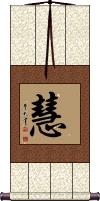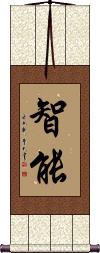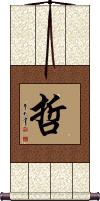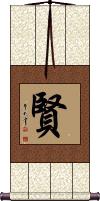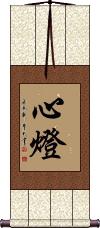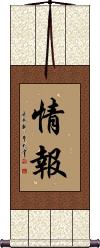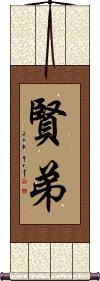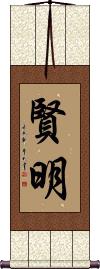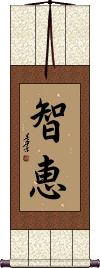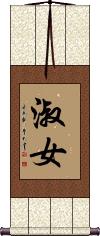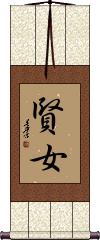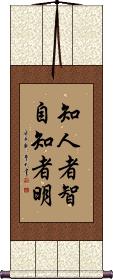Many custom options...
And formats...

Intelligent in Chinese / Japanese...
Buy an Intelligent calligraphy wall scroll here!
Personalize your custom “Intelligent” project by clicking the button next to your favorite “Intelligent” title below...
6. Intelligence / Information-Gathering
9. Wise Woman
11. A Wise Man Changes His Mind
12. Those Who Understand are Clever, Those Who Know Themselves are Truly Wise
13. A wise person reflecting a thousand times can still make a mistake
Wisdom / Intelligence
Intelligence / Intellect
These two characters mean intelligence or intelligent.
The first character means wisdom, intellect, or knowledge.
The second means ability, talent, skill, capacity, capable, able, and can even mean competent.
Together, 知能 can mean “capacity for wisdom,” “useful knowledge,” or even “mental power.” Obviously, this translates more clearly into English as “intelligence.”
Note: This is not the same word used to mean “military intelligence.” See our other entry for that.
![]() In modern Japan, they tend to use a version of the first character without the bottom radical. If your audience for this artwork is Japanese, please click on the Kanji to the right instead of the button above.
In modern Japan, they tend to use a version of the first character without the bottom radical. If your audience for this artwork is Japanese, please click on the Kanji to the right instead of the button above.
Tetsu / Wise Sage
哲 is a Japanese name that is often romanized as Tetsu.
The meaning of the character can be: philosophy; wise; sage; wise man; philosopher; disciple; sagacity; wisdom; intelligence.
哲 can also be romanized as: Yutaka; Masaru; Hiroshi; Tooru; Tetsuji; Choru; Satoru; Satoshi; Akira; Aki.
Wise and Virtuous
賢 is used to refer to being a wise, trustworthy, and virtuous person. But it also contains the ideas of intelligence, genius, scholarship, virtue, sage, saint, good, and excellent in character.
賢 is used in Chinese, Japanese Kanji, and old Korean Hanja. Also used in a Buddhist context with the same meaning.
Note: Can also be the male given name, Masaru, in Japanese.
Inner Light / Intelligence
Intelligence / Information-Gathering
If you are a government spy, engaged in business espionage, or in some military intelligence department, 情報 is both the title of what you are doing and what you are collecting about your enemy.
It is suggestive by itself of military intelligence but applies to corporate intelligence if you are keeping an eye on your competition in business.
Wise Younger Brother
Wisdom / Intelligence
賢明 is a Japanese word that refers to wisdom, intelligence, and prudence.
賢明 was originally a Chinese word that referred to a wise person or enlightened ruler. It means wise and able, sagacious now in China.
Wisdom / Intelligence
Wise Woman
淑女 is an ancient title for a wise and virtuous woman or lady
In Japan, this can be a female given name, Kiyome.
Wise Woman
Military Intelligence
軍事情報 is the full way to say “Military Intelligence.”
The first two characters mean “military affairs.”
The second two characters mean “intelligence” or “information-gathering.”
If you work in the G2 section of your military unit, this is the wall scroll for you.
See Also: Military
A Wise Man Changes His Mind (but a fool never will)
君子豹変す is a Japanese proverb that suggests that a wise man is willing to change his mind, but a fool will stubbornly never change his.
The first word is 君子 (kunshi), a man of virtue, a person of high rank, a wise man.
The second word is 豹変 (hyouhen), sudden change, complete change.
The last part, す (su), modifies the verb to a more humble form.
The “fool” part is merely implied or understood. So if wise and noble people are willing to change their minds, it automatically says that foolish people are unwilling to change.
Those Who Understand are Clever, Those Who Know Themselves are Truly Wise
A wise person reflecting a thousand times can still make a mistake
These search terms might be related to Intelligent:
A Bright Future
Bright and Promising Future
Bright Pearl
Clever
Clever / Superb / Wonderful
Light / Bright
Light / Bright / Shine
Light / Bright and Promising Future
Scarlet / Bright Red
Sharp
Sunny / Clear and Bright
Those Who Understand Are Clever, Those Who Know Themselves Are Truly Wise
The following table may be helpful for those studying Chinese or Japanese...
| Title | Characters | Romaji (Romanized Japanese) | Various forms of Romanized Chinese | |
| Wisdom Intelligence | 慧 | e / kei | huì / hui4 / hui | |
| Intelligence Intellect | 智能 / 知能 智能 | chinou / chino | zhì néng / zhi4 neng2 / zhi neng / zhineng | chih neng / chihneng |
| Tetsu Wise Sage | 哲 | tetsu | zhé / zhe2 / zhe | che |
| Wise and Virtuous | 賢 贤 | ken | xián / xian2 / xian | hsien |
| Inner Light Intelligence | 心燈 心灯 | shin tou / shintou / shin to | xīn dēng / xin1 deng1 / xin deng / xindeng | hsin teng / hsinteng |
| Intelligence Information-Gathering | 情報 情报 | jouhou / joho | qíng bào / qing2 bao4 / qing bao / qingbao | ch`ing pao / chingpao / ching pao |
| Wise Younger Brother | 賢弟 贤弟 | ken tei / kentei | xián dì / xian2 di4 / xian di / xiandi | hsien ti / hsienti |
| Wisdom Intelligence | 賢明 贤明 | ken mei / kenmei | xián míng xian2 ming2 xian ming xianming | hsien ming hsienming |
| Wisdom Intelligence | 智恵 | chie | ||
| Wise Woman | 淑女 | shukujo | shū nǚ / shu1 nu:3 / shu nu: / shunu: | shu nü / shunü |
| Wise Woman | 賢女 | kenjo | ||
| Military Intelligence | 軍事情報 军事情报 | gunji-jouhou gunji-joho | jūn shì qíng bào jun1 shi4 qing2 bao4 jun shi qing bao junshiqingbao | chün shih ch`ing pao chünshihchingpao chün shih ching pao |
| A Wise Man Changes His Mind (but a fool never will) | 君子豹変す | kun shi hyou hen su kunshihyouhensu kun shi hyo hen su | ||
| Those Who Understand are Clever, Those Who Know Themselves are Truly Wise | 知人者智自知者明 | zhī rén zhě zhì zì zhī zhě míng zhi1 ren2 zhe3 zhi4 zi4 zhi1 zhe3 ming2 zhi ren zhe zhi zi zhi zhe ming zhirenzhezhizizhizheming | chih jen che chih tzu chih che ming | |
| A wise person reflecting a thousand times can still make a mistake | 智者千慮必有一失 智者千虑必有一失 | zhì zhě qiān lǜ bì yǒu yī shī zhi4 zhe3 qian1 lu:4 bi4 you3 yi1 shi1 zhi zhe qian lu: bi you yi shi zhizheqianlu:biyouyishi | chih che ch`ien lü pi yu i shih chihchechienlüpiyuishih chih che chien lü pi yu i shih |
|
| In some entries above you will see that characters have different versions above and below a line. In these cases, the characters above the line are Traditional Chinese, while the ones below are Simplified Chinese. | ||||
Successful Chinese Character and Japanese Kanji calligraphy searches within the last few hours...
